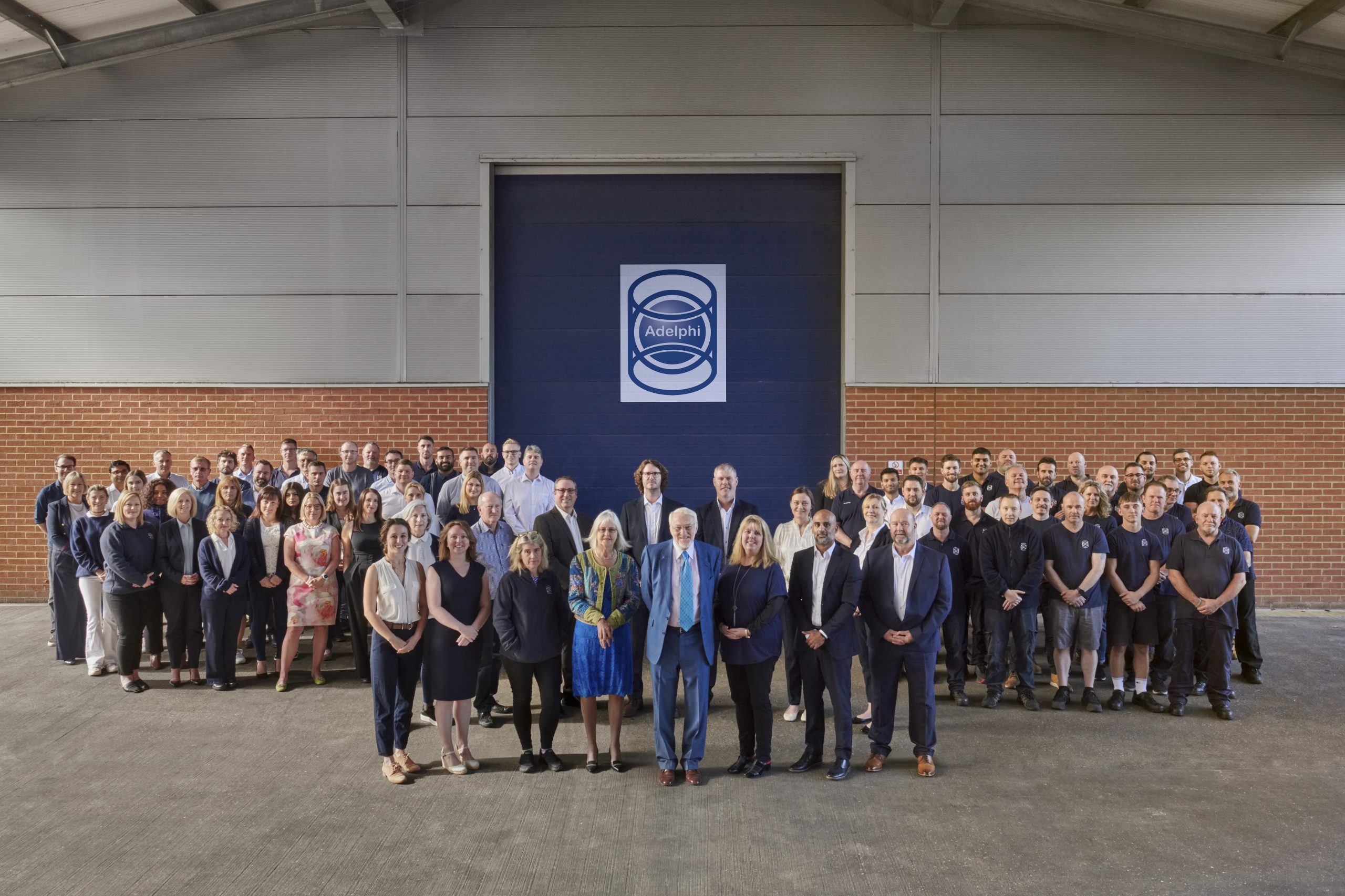News Blog
Keep up to date with the latest news, insights and features from the Adelphi Group of Companies
Environmentally Preferable Purchasing
July 18, 2024
Key Considerations for Sustainably and Ethically Minded Businesses
Glen Smith
Strategic Buyer at the double environmental-award winning Adelphi Group of Companies

Here at Adelphi, our suppliers play a pivotal role in our Net Zero and B-Corp vision, engaging with best-in-class manufacturers. We are developing our own Environmentally Preferable Purchasing Policy ourselves, and are paying forward our experiences, successes, challenges and learnings to other like-minded businesses.
Environmentally Preferable Purchasing (EPP) involves intentionally selecting products and services that have a reduced impact on human health and the environment, when compared to competing goods or services that serve the same purpose. This practice not only addresses the growing consumer demand for greener choices, but also supports broader corporate social responsibility goals.
For sustainably and ethically minded businesses, adopting EPP principles can lead to significant environmental benefits, cost savings, and enhanced brand reputation. This article explores the key considerations businesses should keep in mind when implementing EPP strategies, offering insights into best practices, challenges, and the advantages of prioritizing environmentally preferable products in your procurement processes.

Adelphi Group of Companies: A Case Study
Sharing our journey
When we started on our mission of reducing and aiding sustainability in our supply chain we discovered that some of our suppliers weren’t as aligned with our vision as we had hoped, and that having over 1,200 suppliers on our system simply wasn’t best practice. Using our Supplier Code of Conduct standards, over the past six months we have been able to reduce our approved supplier base to just over 600, with further reductions to come.
Our key suppliers are reviewed and analysed based on a collection of questions, including about company cars, their sustainability officer/policy, their impact on biodiversity and how they track and monitor this impact. The questionnaire they receive is highly weighted to sustainability criteria, and marks (points) are only awarded to those suppliers who are taking an active approach with policies in place.
Our team has committed to visiting over 60 suppliers in the next 2 years to discuss the future and how we can all improve our sustainable practices. We ask all our suppliers to recycle their packaging material, as that is a key practice here at Adelphi, and by doing so we are hoping to reduce new packaging purchases by up to 50% where applicable.
We have included in our strategy an aim to reduce and consolidate deliveries, to reduce the number and impact of our shipments. Using vigorous planning parameters, we are able to engage with our suppliers and commit to purchasing a larger supply to consolidate quotations, purchase orders, shipments and invoicing. This also reduces the amount of paperwork required for excess orders and deliveries. It also helps our supplier with a guaranteed purchase order for the next few months, which can help them invest more into sustainability and a better future for their organization.
These conversations with our suppliers also help us to discuss how they select their own courier companies, ensuring they are reviewing any carbon neutral policies or the vehicles the company maybe using, which can help guarantee that everyone is doing their bit for the environment.
We hope by starting these conversations we can work with our suppliers and encourage them to also interrogate their own sustainable practices. Over the next two years these conversations will be exciting and thought provoking for both Adelphi and our suppliers.
 Asking the Right Questions
Asking the Right Questions
It’s really important to ask questions of your suppliers which reflect what is important to your own company’s values. For example, as Sustainability is one of our primary concerns at Adelphi, we ask all prospective suppliers if they are ISO 14001 (Environmental Management Systems) accredited. This represents the gold standard in our evaluation process.
We also ask them to supply us with copies of their Environmental Policy, Net Zero Policy and Corporate Social Responsibility Policy, so that we can assess their commitment to high standards in these areas.
It is also essential to question; Does the prospective supplier add value to Adelphi, in all of these three key considerations:
- Economy – minimising our costs
- Efficiency – quicker, simplified and/or streamlined processes
- Environmentally – a high degree of care and concern throughout their operations
The Power of the Purchaser
Why you have more influence than you may realise
In the current economic climate, every order matters, and your influence extends even to non-sustainably minded suppliers.
At Adelphi, if customers wish to invite us to take on additional sustainability initiatives before they commit to working with us, this is something which we are always pleased to consider.
Likewise, we require all of our supplies to adhere to our code of conduct, which covers aspects such as waste management, modern slavery, employee safety and wellbeing, and more.

Expense vs. Integrity: Striking the Right Balance
It is important to weigh up the financial costs of each of your products/components, versus the ethical costs which could come if you can’t maintain the integrity of your business values.
It is accepted that there will always be some business critical components for which you may have limited or no choice between suppliers. The degree to which you can therefore interrogate these high dependency suppliers is significantly less, since you may have no choice but to purchase from them even if their values don’t align with your own. At Adelphi, an example of this is precision-machined components, where only a handful of suppliers can supply to the exacting standards we require. We would not compromise the quality of our own products by moving away to a supplier who provided lower quality components, even if their environmental policy was strong.
However, in the majority of instances, you are likely to have a wide range of suppliers to choose from. Examples at Adelphi include providers of office supplies, branded and/or promotional materials, cleaning products and more. We view our selection of supplier for each of these objects or services, as an opportunity to improve our own environmental impact, and demonstrate our commitment to these improvements. Where we have the choice to do so, we would prefer to spend more on – for example – office supplies, from a company which is as committed to social and environmental good as we are ourselves.
At Adelphi we are proud to make intentional alliances with key Ethical and Sustainable suppliers who support and engage with Adelphi’s vision, rather than simply choosing the supplier we find first on a Google search. I myself wouldn’t be called a Strategic Buyer if there wasn’t this sustainability strategy underpinning my work. Our values are at the forefront of our consciousness, and are lived throughout the business, in decisions both large and small.
One such key supplier is Recorra, who provide our waste management services. They track and monitor the waste we generate, and report upon the level of re-use and recycling we achieve. For example, disposal of glass vials from one Adelphi Group company would previously have been to landfill. Recorra now ensure that they are re-purposed, including most recently into roads!
This partnership enables us to set realistic, achievable continuous improvement targets.
Top Tips & Quick Wins
Turning intention into action
- Define your own company values. This will enable you to evaluate your suppliers based upon who aligns most successfully with what you want to achieve.
- Improve your visibility of suppliers’ practices. Never be afraid to ask. The best suppliers will welcome your questions, as it gives them a chance to demonstrate what they can do!
- Utilise a scoring matrix. For example Kraljic’s Matrix, which differentiates suppliers based on their position in our supply, against Cost vs Risk to our business. It has four quadrants: Strategic, Leverage, Bottleneck and Routine.
- Use this matrix to streamline your supplier base. As mentioned at the very start of this article, giving a larger amount of your business to a lesser number of suppliers gives you greater leverage when it comes to negotiating pricing discounts and other terms. This is known as economies of scale.

We Noticed Benefits: You Can Too!
Example 1: Buying a year of stock, which has generated both cost and relationship benefits. Buying in bulk using a call-off order system has enabled us to use economies of scale to pay less per individual component, and holding extra of these components in stock will also reduce the lead time to market for some of our equipment.One example component, a tie bar, has generated over £3,000 in savings alone.
Example 2: Sustainability as a PR tool. Sustainability credentials are now a primary decision making factor for customers. Your approach can either win or lose you business – so make sure that you are winning! Examples of positive PR which Adelphi has benefitted from include:
- Sustainability awards, which are free to enter, and generate positive publicity and brand awareness for your business.
- Linking with sustainability bloggers, which generates backlinks to your website and improves your discoverability in Google.
- Improved public perception: the highest content engagement we see on our social media channels is with sustainability posts, which are liked and re-shared to increase exposure!
- Example 3: Ideas and networking and improving together. At Adelphi we are proud to host suppliers and customers for visits, and always include a tour to show off the sustainable elements of our site. We also love attending tours of supplier sites in turn! Meeting in-person rather than online generates a great opportunity for ideas sharing, and you may inspire or be inspired in the process too!
Would you like to find out more? Contact: glen.smith@adelphi.uk.com

